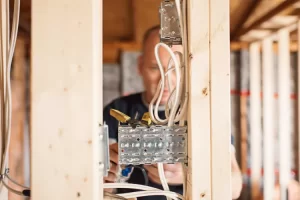The Importance of Regular Electrical Inspections for Home Safety
As Pennsylvania homeowners, we often prioritize routine maintenance tasks such as cleaning gutters, changing air filters, or inspecting our plumbing systems. However, one crucial aspect that should never be overlooked is the electrical system. Regular electrical inspections are essential for ensuring the safety of your home and protecting your loved ones from potential hazards. In this article, we will explore why electrical inspections are important, what they entail, and the potential risks of neglecting them.
What is typically inspected and tested during a home safety inspection?
An electrical home safety inspection typically covers:
- Verification of proper light bulb wattage
- Switch and wall outlet operation and condition;
- Shock or electrocution hazards;
- Verification that arc fault circuit interrupters (AFCIs) are operating properly;
- A check of all safety and security lighting;
- Confirmation of grounding systems;
- Validation of appropriate surge protection;
- Verification of the proper placement of smoke detectors;
- Testing of smoke detectors;
- Testing of carbon monoxide detectors;
- Inspection of the electrical panel for appropriate labels, amps and operation;
- An examination of outdoor electrical systems;
- A detailed, prioritized report on all areas of attention concerning the electrical system of your home. The report will include an evaluation of the overall condition of your electrical installation and whether it is safe or in need of corrective work. It will summarize the test results and any point out inadequacies that were present when the testing was done, along with a list of items that need attention.
Ensuring Electrical System Integrity
Your home’s electrical system is like its nervous system, responsible for delivering power to every corner. Over time, wear and tear can occur, and issues may arise that compromise its integrity. Electrical inspections conducted by licensed professionals can identify hidden problems such as faulty wiring, loose connections, or outdated components. Detecting and addressing these issues early on can prevent electrical failures, fires, or even electrical shocks.
Identifying Overloaded Circuits
With the ever-increasing number of electrical devices in our homes, it’s easy to overload circuits, leading to overheating and potential hazards. During an electrical inspection, an electrician can assess the load distribution across circuits and ensure they are properly balanced. By identifying overloaded circuits, they can recommend redistributing the electrical load or installing additional circuits to prevent overheating and minimize the risk of electrical fires.
Detecting Outdated Wiring and Components
Many older homes may still have outdated electrical wiring or components that do not meet modern safety standards. Inspecting and identifying such components is crucial to prevent electrical hazards. An electrical inspection can determine if your home requires updates such as rewiring, replacing outdated panels, or upgrading to safer circuit breakers. By upgrading your electrical system, you not only enhance safety but also increase the overall efficiency and reliability of your home’s electrical infrastructure.
Protecting Against Electrical Fires
Electrical fires pose a significant risk to homeowners, resulting in property damage, injuries, or even fatalities. Faulty electrical systems are one of the leading causes of residential fires. Regular electrical inspections can help identify potential fire hazards, such as faulty wiring, loose connections, or overloaded circuits. Electricians can also check for proper grounding and examine the condition of electrical outlets and switches. Taking proactive measures to address these issues significantly reduces the risk of electrical fires.
Ensuring Compliance with Safety Regulations
Electrical safety regulations and codes evolve over time to ensure the highest level of protection for homeowners. During an electrical inspection, electricians ensure that your home’s electrical system meets current safety standards and local regulations. This is particularly important if you’re planning renovations or adding new electrical installations to your home. Compliance with safety regulations not only ensures your family’s safety but also helps avoid potential legal issues when selling or insuring your home.
Bottom Line
Regular electrical inspections are vital for maintaining the safety and well-being of your home and family. By detecting hidden issues, preventing electrical failures, and addressing potential hazards, these inspections can significantly reduce the risk of electrical fires, shocks, or other accidents. Don’t overlook the importance of electrical inspections and consult a licensed electrician to schedule a comprehensive assessment of your home’s electrical system. Investing in regular inspections today can save you from costly repairs, property damage, and most importantly, ensure the safety of your loved ones for years to come.
